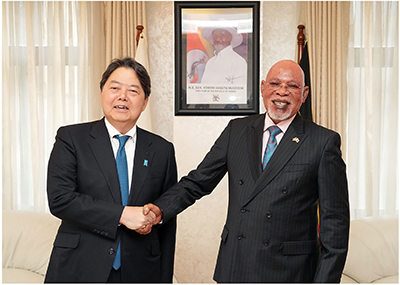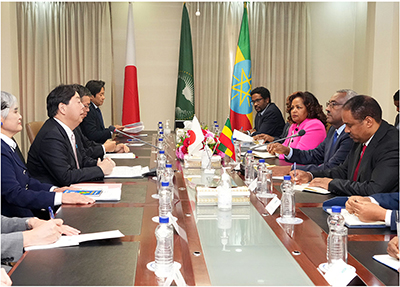Diplomatic Bluebook 2024
Chapter 2
Resilient and Unwavering Regional Diplomacy
2 East Africa
(1) Uganda
Under President Yoweri Museveni's long-serving administration, Uganda has enjoyed economic growth owing to its stable domestic politics. The country is actively accepting refugees from neighboring countries, and currently hosts approximately 1.5 million refugees, the largest number in Africa. It is also contributing to regional stability by deploying its own army to the African Union Transition Mission in Somalia (ATMIS)3 and to the eastern region of the Democratic Republic of the Congo, where armed groups are active.
In August, Foreign Minister Hayashi became the first Japanese foreign minister to visit the country, paying a courtesy call to President Museveni and meeting with Minister of Foreign Affairs Jeje Abubakhar Odongo. During the courtesy call and meeting, the two countries affirmed to further strengthen bilateral relations and to continue to work together on various issues facing the international community.
 Japan-Uganda Foreign Ministers' Meeting (August 2, Kampala, Uganda)
Japan-Uganda Foreign Ministers' Meeting (August 2, Kampala, Uganda)- 3 African Union Transition Mission in Somalia (ATMIS): Established in March 2021 with the approval of the UN Security Council, ATMIS restructured the mandate of the African Union Mission in Somalia (AMISOM) to facilitate a transition to a system in which the Somali government takes responsibility for maintaining security.
(2) Ethiopia
Ethiopia has the second largest population in Africa (120 million people) and high economic potential, with a high annual growth rate of around 8% from 2004 to 2019 (approximately 6% since 2020).
Armed clashes that occurred between the federal government and the Tigray People's Liberation Front (TPLF) continued from November 2020, but the situation has improved since the November 2022 peace agreement. Meanwhile, in the Amhara region, where the armed forces and the government have been fighting since April 2023, the conflict intensified in August, and the government declared a state of emergency in the region.
In August, Foreign Minister Hayashi visited the country, paid a courtesy call on Prime Minister Ahmed Ali Abiy and met with Deputy Prime Minister and Minister of Foreign Affairs Mekonnen Hassen Demeke. They confirmed future cooperation in addressing various issues in the international community, including bilateral cooperation in the economic field and ensuring food security in Africa.
 Japan-Ethiopia Foreign Ministers' Meeting (August 3, Addis Ababa, Ethiopia)
Japan-Ethiopia Foreign Ministers' Meeting (August 3, Addis Ababa, Ethiopia)(3) Eritrea
Eritrea is a country located on the international strait connecting the Indian Ocean, the Suez Canal, and Europe. Its territorial waters are a crossroads in terms of economic security, with many Japanese-related ships passing through them. Eritrea's role in the stability of the “Horn of Africa” region is important, and in FY 2024 Japan will upgrade its consulate in Eritrea to an embassy.
(4) Kenya
Kenya is an important like-minded country for Japan that shares fundamental values and principles such as democracy and the rule of law. Kenya has been actively involved in the peace and stability of East Africa, including through its efforts to resolve conflicts in Sudan, Ethiopia, Somalia, and the Democratic Republic of the Congo. Kenya is also the economic hub of East Africa and one of the leading hubs of Japanese companies in Africa. In 2023, the 60th anniversary of the establishment of diplomatic relations with Japan, Prime Minister Kishida visited Kenya in May and held a summit meeting with President William Samoei Ruto to discuss issues challenging the international community, including Russia's aggression against Ukraine and the situation in Sudan. They also shared the view to further develop bilateral relations, including business relations. In February 2024, President Ruto visited Japan and held a summit meeting with Prime Minister Kishida, where the two leaders shared the view to further strengthen economic relations, promote a “Free and Open Indo-Pacific (FOIP)”, and enhance cooperation in the international arena.
(5) Union of Comoros
The Union of Comoros is Japan's partner and supports FOIP as a maritime nation like Japan. In 2023, as the chair of the AU, the country has been active in diplomatic efforts. Japan invited the country, as chair of the AU, to the G7 Hiroshima Summit, which it hosted in May, and President Assoumani Azali contributed to the discussions. At the Japan-Comoros summit held on that occasion, the two countries affirmed cooperation on FOIP and the AU's participation as a permanent member of the G20.
(6) Djibouti
Djibouti is an important partner in FOIP because it is located on an international shipping route that connects the Indian Ocean with the Suez Canal and Europe and is used by many Japanese vessels. Japan has had a Self-Defense Forces (SDF) base here since 2011 and has been engaged in anti-piracy operations. The base was also used to evacuate Japanese nationals and others when clashes broke out in Sudan in April. State Minister for Foreign Affairs TAKEI Shunsuke, who was dispatched to handle the evacuation, expressed gratitude for Djibouti's full cooperation in the evacuation in his meeting with Secretary General of the Ministry of Foreign Affairs and International Cooperation Mohamad Ali Hassan, and both affirmed their commitment to continue deepening Japan-Djibouti relations towards the realization of FOIP.
In December, Japan signed and exchanged new notes with the Djibouti government to enable the SDF of Japan to secure, in an appropriate manner, the status of the SDF in Djibouti for the protection and transportation of Japanese and other nationals abroad and for the development of a temporary posture for the possibility of such measures.
(7) Sudan
In April, fighting broke out in the Sudanese capital, Khartoum, between the Sudanese Armed Forces and the Rapid Support Forces, and the fighting spread to other parts of the country. More than six million people have been displaced both inside and outside the country, creating a humanitarian crisis in Sudan and neighboring countries. The United States (U.S.), Saudi Arabia and other countries, regional organizations such as the AU and the Inter-Governmental Authority on Development (IGAD), as well as the UN, are continuing to mediate efforts to achieve a ceasefire, but a lasting ceasefire is yet to be achieved. Japan has provided assistance totaling 92 million U.S. dollars to address humanitarian issues in Sudan and neighboring countries and is supporting efforts to address various issues together with regional organizations such as IGAD and the AU, as well as international organizations such as the UN.
(8) Seychelles
Seychelles is located at a strategic point in the Indian Ocean and is an important partner for Japan in realizing FOIP. It is an island nation renowned for tourism and rich fishery resources and boasts the highest GDP per capita in Sub-Saharan Africa. However, it is susceptible to the effects of climate change and is vulnerable as a small island nation. Until now, the Embassy of Japan in Kenya was accredited to Seychelles and had a dual-role consulate in the country, but in January 2024 it was upgraded to the Embassy of Japan in Seychelles.
(9) Somalia
The humanitarian situation in Somalia remains severe due to factors such as intermittent terrorist activities by the radical Islamist group Al-Shabaab and drought. Japan has been supporting the efforts of President Sheikh Mohamud Hassan, who took office in May 2022, toward the consolidation of peace, and in 2023, provided humanitarian assistance totaling approximately 27 million U.S. dollars in various areas, including food, health, and medical care, through international organizations.
(10) Tanzania
Tanzania is located in a strategic position connecting eastern and southern Africa and continues to experience economic growth thanks to its stable domestic politics. Under President Suluhu Hassan Samia, who took office in April 2021, the country is also working to attract investment and develop large-scale infrastructure such as railways and ports.
The First Japan-Tanzania Business Environment Improvement Committee was held in May, where discussions were held toward facilitating investment and trade between the two countries.
(11) Burundi
Burundi is a landlocked country located in the central part of the African continent. Under President Évariste Ndayishimiye, who took office in May 2020, Burundi is accelerating efforts to fight corruption and improve relations with neighboring countries. Japan has been providing ongoing development cooperation to Burundi since the 1970s and continues to provide support for infrastructure development and the improvement of basic social services.
(12) Madagascar
Madagascar is an island country in the Indian Ocean located off the southeastern coast of Africa that supports FOIP. It is also an important country as a supplier of mineral resources. In June, Foreign Minister Hayashi paid a courtesy call on President Andry Nirina Rajoelina during his visit to France and discussed bilateral cooperation, including an integrated nickel-cobalt production project run by a Japanese company, as well as strengthening food security. A presidential election was held in November in which President Rajoelina was re-elected.
(13) South Sudan
South Sudan has been in turmoil since clashes that broke out between the government and anti-government groups in December 2013, but the Revitalized Agreement on the Resolution of the Conflict in South Sudan (R-ARCSS) was signed in September 2018. As the deadline for the implementation of this agreement approaches in February 2025, delays have been seen in the drafting of a constitution, preparation for elections, and so on.
Japan continues to support the peace and stability of the country through development cooperation through the Japan International Cooperation Agency (JICA) and support for UN Peacekeeping Operations (PKO). In December, Japan decided to provide approximately 12 million U.S. dollars in assistance via international organizations for areas such as ceasefire monitoring, election assistance, and humanitarian assistance.
(14) Mauritius
Mauritius is a maritime nation like Japan and is an important partner in realizing FOIP. In March, State Minister for Foreign Affairs Yamada met with Minister of Foreign Affairs, Regional Integration and International Trade Alan Ganoo at the G20 Foreign Ministers' Meeting. In May, the Public and Private Sector Joint Mission for Promoting Trade and Investment in Africa, headed by State Minister for Foreign Affairs Yamada, visited Mauritius. In September, Prime Minister Kishida held a brief talk with Prime Minister Pravind Kumar Jugnauth and agreed to develop bilateral relations, including trade and investment.
(15) Rwanda
Under the leadership of President Paul Kagame, Rwanda has continued its efforts toward economic development and national reconciliation. The country aims to become an ICT-based nation and has been experiencing rapid development, particularly in the field of information and communications technology, and the number of Japanese companies, including startups, entering the country is increasing. Japan is contributing to the digitalization of the country, including providing grant aid for the introduction of an intelligent transport system in the country's capital, Kigali, in October. Japan and Rwanda are also cooperating in the space industry, including launching satellites and training engineers through industry-government-academia collaboration.
